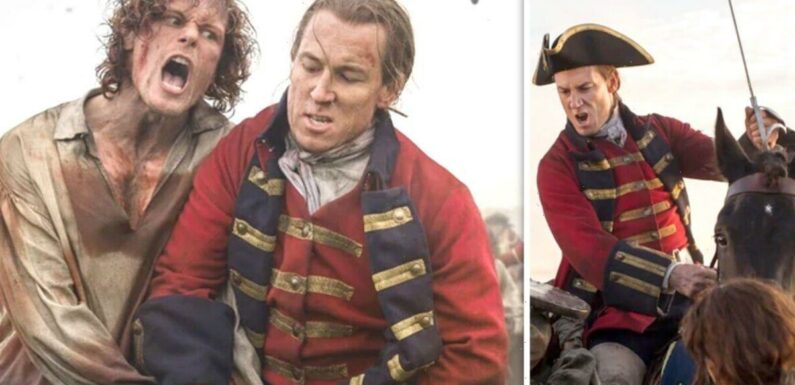
Outlander: Caitlin O’ Ryan & Paul Gorman on their beaus
We use your sign-up to provide content in ways you’ve consented to and to improve our understanding of you. This may include adverts from us and 3rd parties based on our understanding. You can unsubscribe at any time. More info
Outlander villain Captain ‘Black Jack’ Randall (played by Tobias Menzies) has been out of the series for quite a while now after being finished off by Jacobite hero Jamie Fraser (Sam Heughan) at the Battle of Culloden. However, his infamous and sadistic acts remain imprinted on the minds of Outlander fans to this day. While the character was a fictitious entity created by Outlander’s author Diana Gabaldon, who wanted to explore the dark side of human nature, there were some very sadistic individuals during this period who would fall into good company with the evil Redcoat.
Speaking about the real-life figures, Professor Pittock said: “Absolutely. There are very well-documented atrocities, certainly several months after Culloden.
“There are potentially procured assassinations for quite a number of years afterwards because the occupying military – they have difficulties because [of the Scottish judicial system], so they are dealing with Scots law and Scots law won’t really do what they tell them. So they try and circumvent the law.”
The academic continued: “But actually in terms of atrocities, for example at Fort William in the summer of 1746, three men come in to surrender their weapons to the British garrison and they’re hung in the water in fishing nets.
“They’re just automatically killed out of hand. They are there to surrender their weapons and they’re just killed.”


Interestingly, Fort William also had a major role in Outlander and was where Jamie was flogged by Captain Black Jack, leaving the Highlander scarred for life.
Later in the story, Jamie rescued his wife Claire Fraser (Caitriona Balfe) from Fort William after Captain Black Jack attempted to rape her.
But it seems a lot of the brutality and heinous acts were committed during battle or in the direct aftermath.
Professor Pittock detailed how in the aftermath of battle, the wounded and dying were rounded up and the coup de grâce – or final death blow/shot – was administered via the butt of a musket to the face – a cruel manner rather than an act of mercy.


One historical account from the coincidentally-named Captain Fraser, who was a survivor and ended up losing an eye and fracturing his jaw in this practice, revealed this barbaric battlefield behaviour.
Captain Fraser gave evidence, which saw the British Army convicted of these atrocities.
Even Scottish officers serving in the British Army were anonymously giving evidence about the brutal and cruel acts of their fellow servicemen at the time.
Professor Pittock said: “There is an absolute lot of atrocity.” He continued: “Although Randall, as you say is a fictional figure, there were absolutely figures like this: tormenters and torturers.”
One of the big figures was the Duke of Cumberland, who earned the unsavoury title ‘Butcher Cumberland’ for his role in crushing the Jacobite Rising.
Professor Pittock said Cumberland was “very much a case in point”, who not only killed enemies but also those fleeing from battle and civilians alike.
Moreover, the Duke of Cumberland gave orders for the homes of Highlanders to be set alight with people killed and woman raped as part of his bloodthirsty campaign against the Jacobite cause.
Cumberland went as far as driving cattle away from the land so any survivors would starve and again crush any lingering hopes among the Jacobites.
DON’T MISS…
Emmerdale double exit as Sarah Sugden dies after exposing lie [THEORY]
Vera’s Brenda Blethyn admits she ‘failed miserably’ [INTERVIEW]
Happy Valley viewers blast ‘disappointing’ finale [VIEWER REACTIO
He also named the Duke of Kingston’s Regiment of Light Horse as another perpetrator of terrible atrocities, this time in the aftermath of Culloden.
Professor Pittock said: “They killed – admittedly it’s in the aftermath of the battle where it’s not safe to be around – but cutting down women with children in their arms on the road to Inverness was hardly an act of taking action against combatants.
“[Civilians] were walking down the road and they were just cut down. They killed everybody and everything on that road for the five miles into Inverness.”
He said two of the men in Kingston’s Light Horse Regiment has been butchers in their civilian lives with the trade being a very public and prominent one at the tine.
The moniker “butcher” had all the more resonance during this era where Smithfield Market in London would see cattle publicly slaughtered for consumption.
Professor Pittock concluded: “A butcher is very much a public figure, not a person who does things behind closed doors and then a joint appears.”
Outlander season 7 will premiere later this year and seasons 1 to 6 are streaming on Lionsgate+ now
Source: Read Full Article